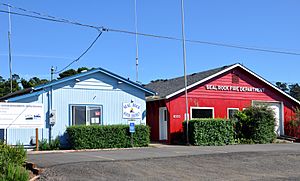Seal Rock, Oregon facts for kids
Quick facts for kids
Seal Rock, Oregon
|
|
|---|---|

Fire department and water district buildings
|
|
| Country | United States |
| State | Oregon |
| County | Lincoln |
| Elevation | 3 ft (0.9 m) |
| Time zone | UTC-8 (PST) |
| • Summer (DST) | UTC-7 (PDT) |
| ZIP code |
97376
|
| Area code(s) | 541 |
| Elevation from United States Geological Survey | |
Seal Rock is a cool coastal community in Oregon, United States. It's located right on the Pacific Ocean. You can find it in Lincoln County, between the towns of Newport and Waldport. It's easy to get there using U.S. Route 101.
What is Seal Rock?
Seal Rock is an unincorporated community. This means it's a group of homes and businesses. But it doesn't have its own local government like a city does. Instead, it's part of the larger Lincoln County.
How Seal Rock Got Its Name
The community of Seal Rock is named after some special rocks. These are called the Seal Rocks. They are a line of rocks that stick out of the ocean. They run along the shore for about 2.5 miles (4 km).
Long ago, people who spoke Chinook Jargon called this area Seal Illahe. This means "seal place" or "seal home." Pioneers, who were early settlers, called it "Seal Rocks." This name came from a large rock, about 20 feet (6 meters) tall. Hundreds of common seals and Steller sea lions used to rest there.
A Bit of History
Seal Rock was once the end point of an important road. This road was called the Corvallis & Yaquina Bay Wagon Road. It was the first road to connect the Willamette Valley to the Oregon Coast.
The town of Seal Rock was planned in 1887. Three blocks of hotels were built there. However, the town didn't grow as fast as people hoped. Later, the road company's assets were given to T. Egenton Hogg. He was a promoter for the Oregon Pacific Railway. The Seal Rock post office was opened in 1890.
Special Places
Seal Rock is also home to an important archaeological site. This site is listed on the National Register of Historic Places. Archaeological sites are places where scientists study the past. They look for old tools, buildings, or other things left behind by people long ago.
 | Chris Smalls |
 | Fred Hampton |
 | Ralph Abernathy |



